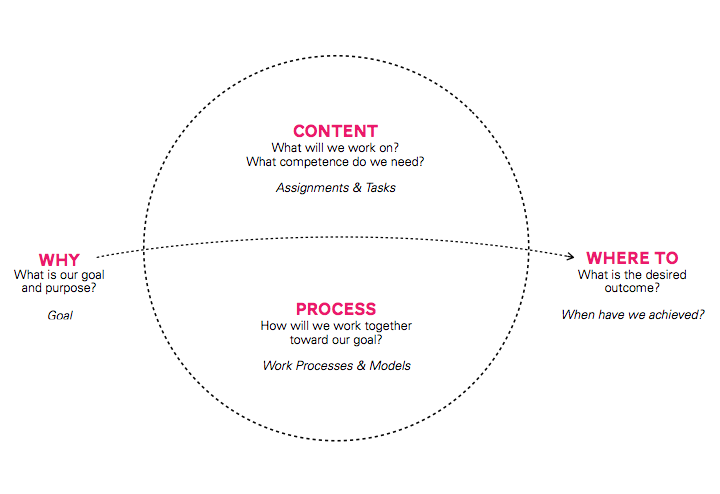IN THE MASTER'S PROGRAM, OUR STUDENTS WORK EXTENSIVELY ON THE CONTENT AND PROCESS MODEL.
We believe:
Every work process has a number of aspects to consider. Consider:
- What is the goal, what is to be achieved?
- Which tasks do we need to complete in order to reach the goal?
- Which work processes or models will help achieve the goal?
- Who are ‘we’ that shall reach the goal?
- How can we measure the end result and interim targets to know they are in line and on target with the goal? How do we know we have achieved the goal? How will we evaluate it?
Goals
Goals set the direction and endpoint of what the group and/or individual strive to achieve. It is often something much more than the specific task at hand. The goal creates a motivating tension between the individuals and their work. The goal is the lighthouse that steers the vessel of work across the waters that the group has to cross.
It is important to analyze and make the goals clear both to oneself and to the group. If not there is a risk that unnecessary work will be done to produce things that are not required to achieve the goal.
When defining the goal it is important that everyone participates and creates a mutual understanding of what the goal is for the group. Something to look out for is the goals of individuals that go against the common goal of the group as they can cause difficulties later on. Therefore you should demonstrate to yourself what you want to get out of doing this piece of work. If the difference between what you want out of it and what actually will be done is too big, you will not be able to be “your very best” in this particular project since your motivation will not be high enough.
Groups that take the time to talk through the goals and create a mutual understanding of what the goals are will most likely not have to spend time later on getting everybody back on the same track.
Interim targets that can be defined are steps towards the goal. Interim targets can sometimes be expressed as assignments within the frame of a goal which brings us onto assignments and tasks.
Assignments and tasks
Assignments and tasks are what you or the group do to achieve the goal. Assignments are larger units, superior to tasks. An assignment that the group has accepted can involve many tasks, but both assignments and tasks should both lead towards the goal.
When you have reached the point in the processes where you start to deal with assignments and tasks you must spend time on how the work should be carried out. There are two parts to cover here; what resources do the group have and what should the actual process look like (the process is covered further down).
Resources come down to keeping an inventory of all the things required to reach the goal; time, money, competences, who will do what, etc. If anything is missing it needs to be obtained or alternatively you have to define what can be achieved with the existing resources in relation to the original goal and prepare to deal with any consequences that may follow.
It is as important to work with and do these interim analyses throughout the process as it is to make the initial analysis and definition of the goal. When analyzing the assignments and asks questions about the work processes will appear as they are closely related to the assignments.
Work processes and work models
The work processes and models deal with the organization we create to accomplish assignments and tasks in order to reach the goal. It is within this process of organizing things we will create the stage where we will meet each other and cooperate, or not.
The processes of how we relate to each other while completing tasks on our way to the goal are of importance. It covers how we communicate, makes decisions, deals with conflicts, gives each other feedback, etc.; all the things that make the relationships within the group run smoothly or cause friction. It is crucial that the group continuously do formative evaluations of its work models and especially its process. These topics are much related to the possibilities and impossibilities that each of us carries within. So who is ‘we’ that is to work together?
We
It was mentioned earlier how important it is to be clear about the goals so that the goals of the individuals and the goals of the work overlap. Who we are is about you and me, about what we bring to the group. It is both about our resources and the different sides of us that may impact how we work together. For example, if I find it hard to receive feedback or project discontent about others or the conditions within the organization.
Every event at work can be an opportunity for self-discovery if I want to and wish to look inside myself to explore what happens within in response to events around me. This way every meeting between us also becomes a meeting for your inner self. This inner meeting becomes particularly apparent when the external circumstances put us under heavy pressure as they might in a project with tight deadlines.
We, therefore, must get to know both ourselves and the ones we work within a team.
When have we achieved the goal and how do we know it?
Whenever the goal is analyzed the evaluation should be considered as well and whenever the goal has reviewed the methods of evaluation must be reviewed too.
The result is the outcome of the group’s performance. The result can be in line with the goal or not. If we have several assignments or tasks they should all aim towards the goal. This is the reason why it is important to think about the evaluation upfront and to conduct it during the process or afterward.
Evaluation can be formative which means it takes place during the process and can help steer the work process back on track if it has lost its focus on the end goal.
Evaluation can also be summative which means it summarises the achieved results and tells us whether they have worked towards the goal and achieved it, not achieved it, or only partially achieved it.
Summative evaluation can be used formative when it can influence a team’s next project and goal.
Want to know more?
To check out our part-time MA Digital Management Program page, click here.
If you have any questions or simply want to chat with one of our Master’s Programs superstars, feel free to contact us on singapore@hyperisland.com.


